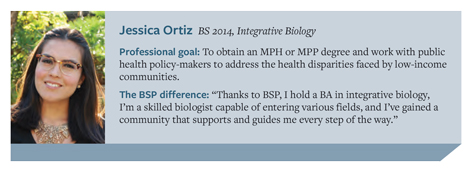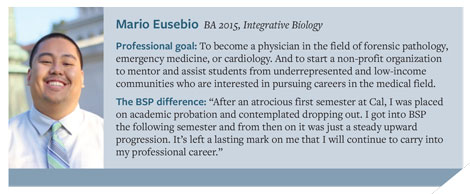
Berkeley prides itself on attracting the best and brightest students, as well as being a public university that’s accessible to all. But Cal admission and academic success are evaluated on traditional measures like test scores and GPAs. For students coming from under-resourced high schools, economically disadvantaged backgrounds, or are first in their families to attend college, such rigid rubrics can put success out of reach. And the STEM fields are even less forgiving for students who enter university with inadequate preparation.
“Institutions like Berkeley best support students from backgrounds similar to those who've been historically successful,” says John Matsui, co-founder and director of the Biology Scholars Program (BSP). Matsui co-created the program in 1992 to better serve “those students whom no one really expected to survive or succeed in science.”Nationally, 60 percent of freshmen who intend to major in STEM fields leave the major.
 The BSP challenges the traditional beliefs about who can or should do science. In the past 26 years, more than 3,500 undergraduates (567 of which were IB majors) have completed the program; of these, 60 percent have been underrepresented minorities, 70 percent women, and 80 percent from low-income backgrounds or were first-in-family to attend college. Potential STEM majors — who are screened not for race but for socio-economic background — are identified during the admissions process. That’s when the BSP — which is compliant with Proposition 209, the California Civil Rights Initiative — lets admits and their families know that there’s a place for them at Cal. The BSP provides an academic
The BSP challenges the traditional beliefs about who can or should do science. In the past 26 years, more than 3,500 undergraduates (567 of which were IB majors) have completed the program; of these, 60 percent have been underrepresented minorities, 70 percent women, and 80 percent from low-income backgrounds or were first-in-family to attend college. Potential STEM majors — who are screened not for race but for socio-economic background — are identified during the admissions process. That’s when the BSP — which is compliant with Proposition 209, the California Civil Rights Initiative — lets admits and their families know that there’s a place for them at Cal. The BSP provides an academic  family that achieves excellence through the support and collaboration of a community of scholars from diverse cultural and economic backgrounds.
family that achieves excellence through the support and collaboration of a community of scholars from diverse cultural and economic backgrounds.
Once the student arrives on campus, BSP helps them develop a customized plan for academic success. They’re advised on what classes to take and when. They’re connected with resources like study groups where they can feel comfortable admitting if they don’t know an answer. And they’re strongly encouraged not to engage in extra-curricular activities for the first semester or year. “That first semester is critical,” Matsui says. “They need to get a sense of where they are in relation to Berkeley’s expectations.” And because 80 percent of BSP students are in financial need, after their first year, they’re connected with paid STEM research internships.
It’s hard to argue with the results. BSP graduates — most of whom plan to pursue careers in health fields — average 85 percent acceptance from medical schools. Berkeley’s average is 55 percent, and the national average is 50 percent. In terms of diversifying the STEM professoriate, four BSP alumni have recently accepted prestigious faculty positions in the Bay Area — two at UC Davis, one at UCSF, and one at Stanford.
“Berkeley is a place that emphasizes excellence, but potential excellence is not always appreciated,” says Matsui. “Twenty-six years of BSP success data
suggests that the science community must rethink its notion of who can do science. The ‘one size fits all’ approach to developing STEM talent just doesn’t work.”
Back to Main Spring 2018 Newsletter Page





